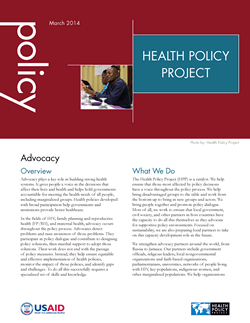The Health Policy Project ended in 2016. Work continued under Health Policy Plus (HP+) until 2022.
Advocacy

Health Policy Project/India
Overview
Advocacy plays a key role in building strong health systems. It gives people a voice in the decisions that affect their lives and health and helps hold governments accountable for meeting the health needs of all people, including marginalized groups. Health policies developed with broad participation help governments and institutions provide better healthcare.
In the fields of HIV, family planning and reproductive health (FP/RH), and maternal health, advocacy occurs throughout the policy process. Advocates detect problems and raise awareness of those problems. They participate in policy dialogue and contribute to designing policy solutions, then marshal support to adopt those solutions. Their work doesn’t end with the passage of policy measures. Instead, they help ensure equitable and effective implementation of health policies, monitor the impact of those policies, and identify gaps and challenges. To do all this successfully requires a specialized set of skills and knowledge.
What We Do
HPP is a catalyst. We help ensure that those most affected by policy decisions have a voice throughout the policy process. We help bring disadvantaged groups to the table and work from the bottom up to bring in new groups and actors. We bring people together and promote policy dialogue. Most of all, we work to ensure that local government, civil society, and other partners in host countries have the capacity to do all this themselves as they advocate for supportive policy environments. Focused on sustainability, we are also preparing local partners to take on this capacity development role in the future.
We strengthen advocacy partners around the world, from India to Jamaica. Our partners include government officials, religious leaders, local NGOs and faith-based organizations, parliamentarians, universities, networks of people living with HIV, key populations, indigenous women, and other marginalized populations. We help organizations develop advocacy strategies and provide them with the tools and skills they need to put those plans into practice, placing particular emphasis on the use of data in advocacy. We provide financial and technical support, strengthen country-level and international advocacy networks, and generate information that supports advocacy efforts, including translating the latest research for use in policies and programs.
Our advocacy efforts include:
- helping women leaders enhance the role of women in FP/RH policymaking
- helping advocates address maternal mortality and promote respectful labor and delivery services
- working with indigenous women’s networks to address inequities, and
- supporting advocacy efforts to reduce stigma and discrimination and address harmful gender norms within HIV programs.
Publications and Resources
HIV Policy Analysis and Advocacy Decision Models for Key Populations
The Health Policy Project (HPP) HIV policy analysis and advocacy decision models are systematic structures and methodologies designed to help stakeholders create an inventory of country policies, analyze these policies against international best practices and human rights frameworks, assess policy implementation, and create a strategic advocacy plan.
A Guide for Advocating for Respectful Maternity Care
Developed with support from the USAID-funded Health Policy Project, A Guide for Advocating for Respectful Maternity Care is a comprehensive resource centered on the Respectful Maternity Care charter, a groundbreaking consensus document that demonstrates the legitimate place of maternal health rights within the broader context of human rights.
Road Map for Implementing and Monitoring Policy and Advocacy Interventions
This suite of tools, developed by the USAID-funded Health Policy Project, the University of Washington, USAID, and the U.S. Centers for Disease Control and Prevention, was designed to strengthen the capacity of key stakeholders to engage in and monitor health policy development and advocacy interventions.
Networking and Coalition Building for Health Advocacy: Advancing Country Ownership
The Health Policy Project prepared this brief to provide leaders of civil society organizations with guidance on working within networks and coalitions to advocate for improved family planning, HIV care and treatment, and maternal health policies and programs.
Accountability and Transparency for Public Health Policy: Advancing Country Ownership
The Health Policy Project prepared this brief to provide leaders of CSOs working in family planning, HIV care and treatment, and maternal health with guidance on ensuring good governance, social accountability, and transparency.
The Impact of Different Scenarios of HIV Prevention, Treatment, and Mitigation Coverage in Ghana: Analysis Using the Goals Model
At the request of the Ghana AIDS Commission and other in-country stakeholders, the Health Policy Project (HPP) updated an analysis of the effects of various funding scenarios on program impact and HIV incidence and coverage. The project used the Goals Model to develop these scenarios,
Health Policy Project Advocacy Activities and Accomplishments - 2012
News
Case Study: Parliamentarians in Malawi Examine Impacts of Rapid Population Growth
The Family Planning Association of Malawi presented the social and economic effects of high fertility to Malawi’s Parliamentary Committee on Health and Population, illustrating how the Government of Malawi could save U.S. $751 million in education and U.S. $1.5 billion in health over a 30-year period.
Mixing Technology and Tradition to Improve Women's Health
Traditional communicator adopts RAPIDWomen model as persuasive advocacy tool to improve health, well-being of women and girls in Mali.
Advocating for Life-Saving Changes
African women leaders define priorities in family planning and reproductive health at advocacy workshop organized by HPP.
Indigenous Women Urge Political Commitment for FP/RH in Guatemala
The National Alliance of Organizations for Reproductive Health of Indigenous Women of Guatemala organized a public forum with candidates for the national congress to demand greater commitment for improving the reproductive health of indigenous women.


